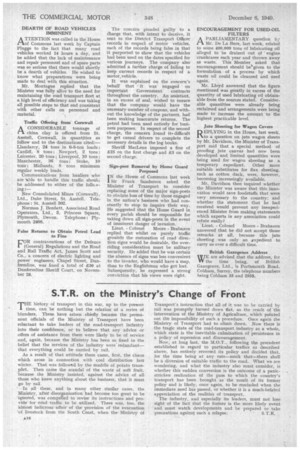DEARTH OF ROAD VEHICLES IMMINENT
Page 18

If you've noticed an error in this article please click here to report it so we can fix it.
A TTENTION was called in the House 1-1of Commons last week by Captain Flugge to the fact that many road vehicles worked 24 hours a day, and he added that the lack of maintenance and repair personnel and of spare parts was so serious that there would shortly be a dearth of vehicles. He wished to know what preparations were being made to deal with this situation.
Mr. Montague replied that the Minister was fully alive to the need for maintaining the road transport fleet at a high level of efficiency and was taking all possible steps to that end consistent with other calls on personnel and material.
Traffic Offering from Cornwall
1-1. A CONSIDERABLE tonnage of
china clay is offered from St. Austell, Cornwall, in quantities as follow and to the destinations cited:— Llandarcy, 24 tons in 6-8-ton loads; Cardiff, 8 tons ; Newport, 2 tons ; Leicester, 20 tons ; Liverpool, 10 tons ; Manchester, 36 tons ; Stoke, 10 tons ; Midlands, 8 tons minimum regular weekly loads.
Communications from hauliers who are'able to handle this traffic shoulu be addressed to either of the folks/jag :— New Consolidated Mines (Cornwall), Ltd., Duke Street, St. Austell. Telephone : St. Austell 302. Norman J. Bennett, Associated Road Operators, Ltd., 5, Princess Square, Plymouth, Devon. Telephone: Plymouth 2408, , False Returns to Obtain Petrol Lead to Fine
FOR contraventions of the Defence (General) Regulations and the Road and Rail Traffic Act, James Scott and Co., a concern of electric lighting and power engineers, Chapel Street, Dunfermline, was fined a total of £30 at Dunfermline Sheriff Court, on November 28.
The concern pleaded guilty to a eharge that, with intent to deceive, it sent to the District Transport Offscer records in respect of motor vehicles, each of the records being false in that it purported to show that the vehicles had been used on the dates specified for various journeys. The company also admitted a further charge of failing to keep current records in respect of a motor, vehicle.
It was explained on the concern's behalf that it was engaged on important Government contracts throughout the country. An assistant, in an excess of zeal, wished to ensure that the company would have the necessary number of coupons, and without the knowledge of the partners, had been making inaccurate returns. The petrol had been used entirely for business purposes. In respect of the second charge, the concern found it* difficult to get casual drivers to complete the necessary details in the log books.
Sheriff MacLean imposed a fine of £25 on the first charge and £5 on the second charge.
Sign-post Removal by Home Guard Proposed IN the House of Commons last week 1 Sir Frank Sanderson asked the Minister of Transport to consider replacing some of the major sign-posts to obviate loss of time by those engaged in the nation's business who had con • stantly to stop to inquire their way. He suggested that the Home Guard in every parish should be responsible for taking down all sign-posts in the event of imminent danger of invasion.
Lieut. Colonel Moore Brabazon replied that whilst on purely traffic grounds the restoration of road direction signs would be desirable, the overriding consideration must be military security. He added that he was certain the absence of signs was less convenient to the invader, who would have a map, than to the Englishman who got lost. Subsequently, he expressed a strong conviction that his views were right. ENCOURAGEMENT FOR USED-OIL FILTERS
PARLIAMENTARY question by ti Mr. De La Bere, last week, related to some. 400,000 tons of lubricating oil alleged to be drained out of • engine crankcases each year and thrown away as waste. This Member asked that encouragement should be*given to the formulation of a process by which waste oil could be cleansed and used again.
Mr. Lloyd answered that the figure mentioned was greatly in excess of the quantity of used lubricating oil obtainable from the sources stated. Considerable quantities were already being reclaimed and arrangements were being made to increase the amount to the highest practicable level.
Jute Sheeting for Wagon Covers
REPLYING in the House, last week, to a question on jute wagon sheets by Mr. Davidson, the Minister of Transport said that a special method of proofing jute canvas had now been developed and limited quantities were being used for wagon sheeting as a temporary expedient. Other more suitable substitutes for flax sheeting, such as cotton duck, were, however, becoming increasingly available.
Mr. Davidson then inquired whether the Minister was aware that this innovation would save foodstuffs that were very necessary to the country; and whether the statement that he had received would prevent any inexperienced Minister from making statements which experts in any association could refute easily?
'Lieut. Colonel Moore Brabazon answered that he did not accept those remarks at all, because this jute sheeting -was only an Rxpedient to carry us over a difficult time.
British Gazogenes Address WE are advised that the address, for VI( the time being, of British Gazogenes, Ltd., is Portsmouth Road, Cobham, Surrey, the telephone numbers being Cobham 35 and 2958.




















































